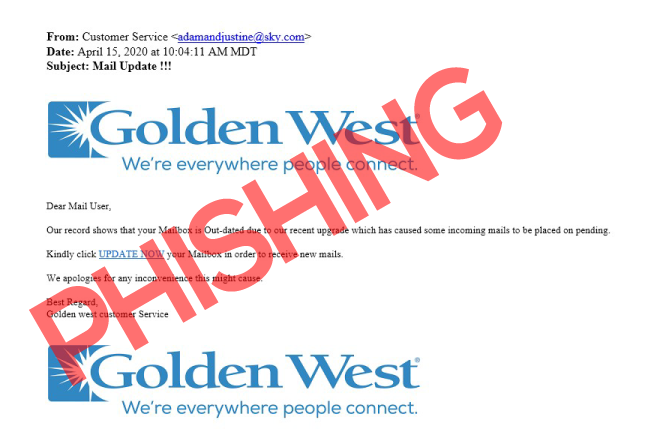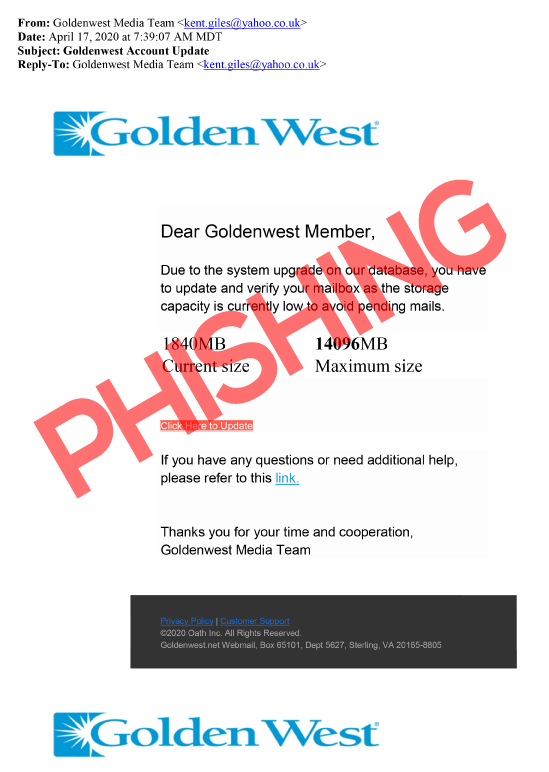Scammers 'Phish' for Unsuspecting Consumers
As more people are staying home in an effort to protect their communities from the coronavirus, they may find themselves vulnerable to another threat – scammers. 
Phishing scams involve the use of email or text messages to trick people into sharing personal information or clicking on an attachment. During the pandemic, Golden West Internet Solutions (GWIS) has experienced an increase in reports about phishing messages.
“These messages look so legitimate,” said GWIS Operations Manager Julie Marsland.
Scammers Impersonate Someone or a Company
The Federal Trade Commission (FTC) works to combat scams and educate consumers. According to the FTC, phishing emails and text messages appear to come from a company the recipient knows or trusts. They may appear to be from a financial institution, a social networking site or an online store.
Phishing emails and text messages often tell a story to trick the recipient into clicking on a link or opening an attachment. For example, the message may say that there has been suspicious activity on the account or personal information needs to be updated or confirmed. The scammer often makes the request seem urgent, hoping the recipient will act quickly without taking time to think things through.
Avoid Links & Attachments
Clicking on any link tells the scammer they’ve reached a live email address, and the next screen will often ask for some personal information. In many cases, it asks for a password.
“It will ask for your current password, and it may ask you to put in a new password,” Marsland said. “Then they’ve got you, and your account is compromised.”
Clicking on an attachment can result in the transfer of malware, ransomware, spyware or a virus. These can hijack the computer to steal confidential data or lock down the computer until a ransom is paid.
Golden West Works to Protect Customers
Through an advanced filtering system, GWIS aggressively works to prevent phishing emails and other scams from reaching customer email inboxes.
“Our filtering system uses algorithms to look for new episodes of spam that they haven’t caught and filtered before,” Marsland said. “Unfortunately, until they see spam hitting a percentage of inboxes, they don’t always have enough details to write a rule to declare it spam.”
Suspect a Phishing Attack?
Customers who receive an email from a company or person they know asking them to click on a link or open an attachment should not do so. Instead, contact the company using a published phone number or website. Do not use the information in the email.
For example, if the email appears to have come from Golden West, call 1-855-888-7777. While Golden West sends periodic informational email messages like this one, the company does not ask for any personal information via email. Golden West will also share scam details on social media to help protect other customers.
Responded to a Phishing Email?
According to the FTC, consumers who have inadvertently shared private information with a scammer, such as a social security, credit card or bank account number, should go to IdentityTheft.gov. The site details specific steps to take based on the information lost. Those who have clicked a link or opened an attachment should update their computer’s security software and run a scan.
How to Report Phishing
Consumers who receive a phishing email or text message should report it. The information can help fight the scammers.
-
Forward the email messages to the GWIS alerts site at spam@ispalerts.com to help filter it out sooner. This site, ispalerts.com also includes a list of other reported email scams.
-
Forward the email messages to the Anti-Phishing Working Group at reportphishing@apwg.org. Forward text messages to SPAM (7726).
-
Report the phishing attack to the FTC at ftc.gov/complaint.
“We try to stay ahead of it,” Marsland said. “We love it when customers share their messages to protect others.”
The Golden West Help Desk is available 24/7/365 to help with all technical questions at 1-855-888-7777.
Below is a screenshot from a phishing email scammers sent last week that appears to come from Golden West. While it may look legitimate, notice the "From" email is not a Golden West email address.

